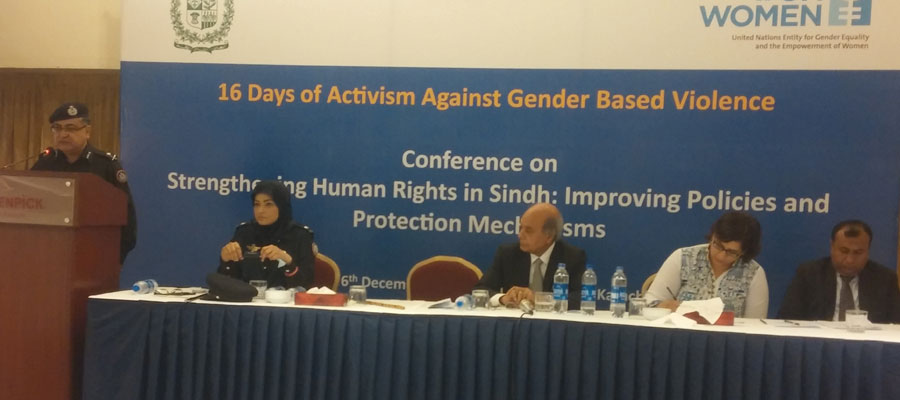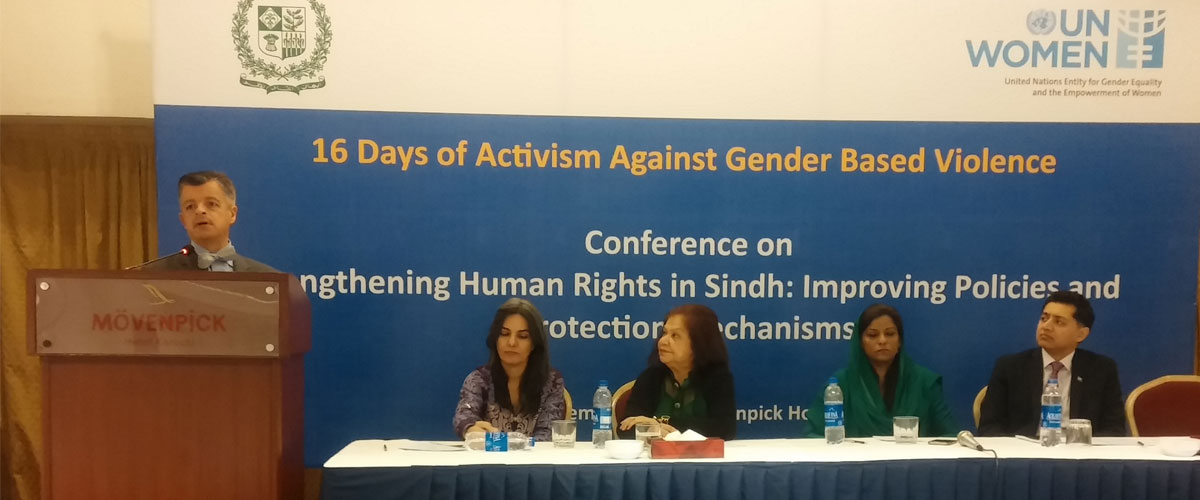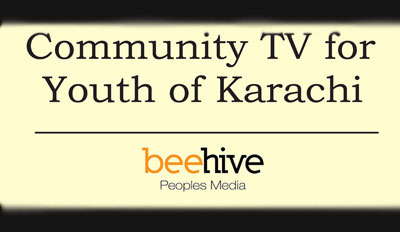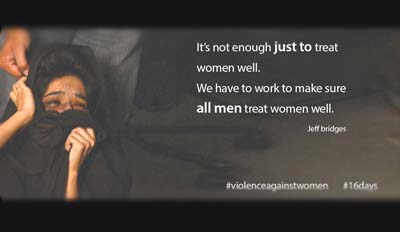Deliberating GBV in Sindh
By Khazima Munaf
A conference meeting on Strengthening Human Rights in Sindh: Improving Policies and Protection Mechanism was held on 6th December at Movenpick Hotel, Karachi. Jamshed Kazi, country representative of UN Women, Pakistan, started the session with a key note speech on the 16 days of activism against GBV. He acknowledged that though this is a global pandemic, its growing extremity in Pakistan is alarming and should be addressed accordingly via discussions and upholding law and order.
Zohra Yusuf, Chairperson (HRCP), and Mehnaz Rehman of Aurat Foundation highlighted the roles of their organizations in this respect and said that these issues are articulated by media and civil society and are even responded by respective legislative bodies but lack of implementation reflects their inadequacy. Mr. Chad Wilton, INL Attaché, U.S. Consulate General from Karachi, spoke extensively on the role of foreign donors in supporting elimination of GBV and upholding Human Rights; one of their initiatives included training of women police in rural areas specially.
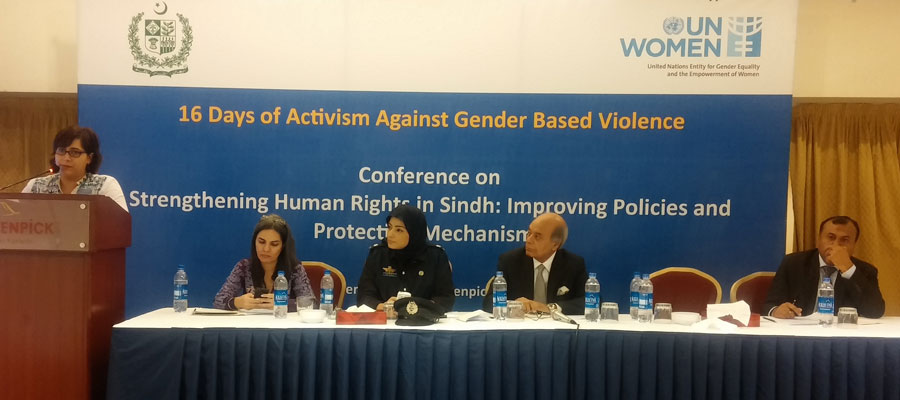
Nafeesa Shah, MNA (PPPP) pointed out that female representation in Pakistan’s parliament reflects a progressive change. Referencing the World Economic Forum where Pakistan stands 143rd on Gender Gap Index; she said that instead of being discouraged, this huge gap should inspire us to create a proper national narrative and not have different provincial ones to counter it. Our Society’s contentment with using exceptional cases symbolic to change should be changed. We should strive for changes in all domains and remove structural biases to bring sustainable developments.
Mussarat Nazir brought the attendees attention to burn victims in Pakistan. She emphasized that a special financial and psychological reviewing is needed to tackle this heinous crime against women. Lack of awareness about the first aid and untrained staff to cater trauma-ridden patients and a lack of necessary medical equipment has rendered such facilities impotent for many. She strongly recommended that the state should locate the sites where these crimes occur most and establish healthcare centres that can spread awareness on the precautionary measures and on relevant first aid. An emergency treatment should be declared mandatory in all government and private hospitals for such patients without any delay of legalities. Medical assistance however is not enough there is a major need of shelters and legal aid.
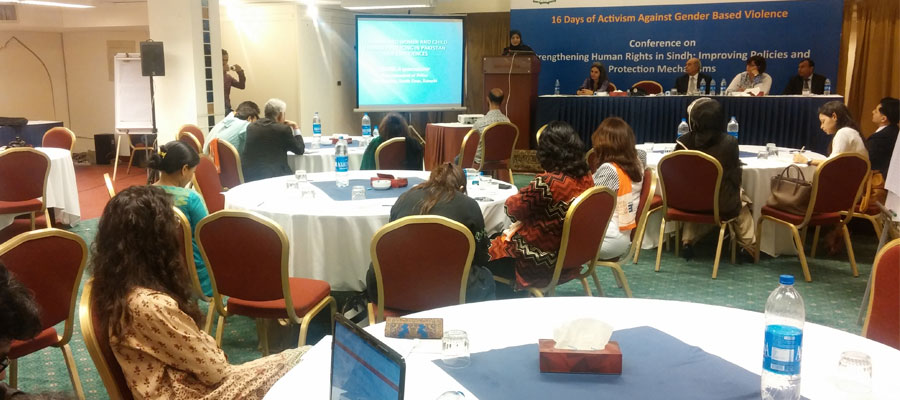
Ms. Uzma Noorani of Panah Shelter homes stated that Panah and Darul Aman share one of the best public-private partnerships in Pakistan but these shelters can work in a wider range if they are present in every district. She suggested that it may be prudent to involve communities to reduce social judgmental pressure from such women to take these steps for survival. The records and databases should also be upgraded for statistical purposes and the state must secure its writ and reestablish shelters in places where militancy in the past has shut them. Third actors, like landlords should be monitored by the state when involved in rehabilitating women in such cases since their role in human trafficking holds precedent. Post protection plans are not found everywhere but limited funds can help for a limited time only.
Mr. Mohammad Ali Shah, Program Manager, shared plans on establishing a separate desk on provincial level for women to register their problems. They also plan on setting up tehsil offices. Secretary of Social Welfare, Sheeren Mustafa assessed the role of public-private partnership regarding GBV. Acknowledging the role of CSOs and NGOs which leaves a lot to be desired for, she highlighted that conferences of this nature are conducted in big cities but rural areas are deprived of such activism and awareness programs. These issues should be viewed in a holistic manner and regard poverty as a macroeconomic problem.
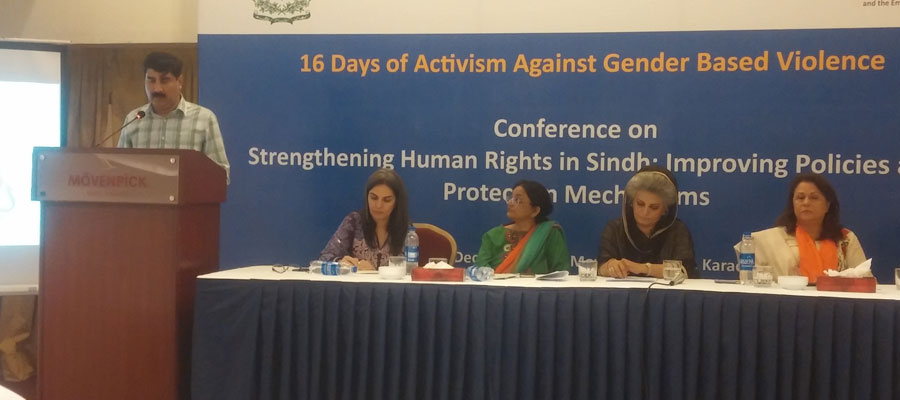
According to Maliha Lari, a consultant at Legal Aid Centre, there have been a number of laws promulgated on social and human rights but there is a lack of functioning that indicates flaws in frameworks and regulations. Evidence based research, societal biases upheld by patriarchy and a review of curriculum should be done to make effective changes in society. A consistent conversation is needed to be regulated in the society to address the oppressive mentality pervasive here. Tahir Iqbal from Legal Right Forum pointed out that the presence of mechanisms has proven fruitless because of lack of monitoring that results in flawed functionality. He spoke over how gender and labor based issues are rarely given due attention.
The role of police with regard to violence against women reflects a trust deficit between both. Shehla Qureshi spoke how a police friendly society is needed to eliminate discriminatory views on privacy of women. She highlighted the need to have more female officers by the fact that in a police force of 132,000 only 1,100 are female officers.
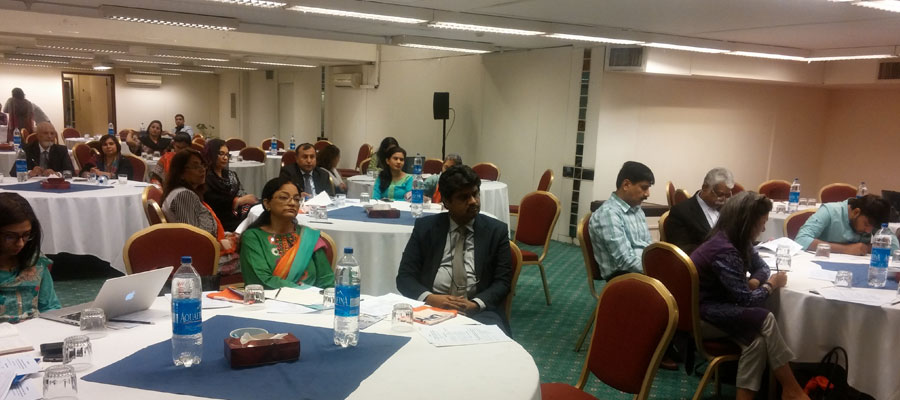
Mr. Zulfiqar Shah of PILER shared the strategic Plan of NCHR. They intend to target complaint handling and investigation, possess specialized software and trained staff. Also, the submission of accurate reports to respective UN forums was stressed that can act as indicators for the government and other organizations.
Shahnaz Wazir Ali urged the Department of Women Development collaborate with other departments and act as an advocate of education, public health etc. She also recommended that health should become a fundamental right so that government could be held accountable. The separate unit for SDGs should work cohesively with other departments to establish functioning frameworks so all can be linked together. Submission of semi-annual reports on Human Rights was also stressed.
